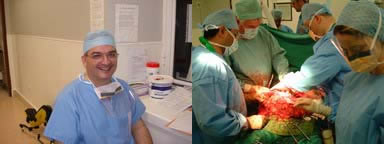 |
 |
|
|
All images, illustrations & flash animation are copyrighted to Deya Marzouk, unless stated otherwise. Copy is prohibited without written permission. Innovative techniques mentioned in this web site were all devised by Deya Marzouk. Please Credit Deya Marzouk if any material is copied from here (with prior permission only) |
This is a rather rare form of gastrointestinal (GI) cancer accounting for about 2% of all Gastrointestinal cancers. Its incidence in East Kent may be slightly higher amounting to 3-4% of GI cancers.
The disease is 2-3 times more common in women and occur most frequently in the 5th & 6th decades.
There is plenty of evidence to link anal cancer to human papilloma virus (HPV) infection, a sexually transmitted infection. The incidence is also higher in those with a variety of other sexually transmitted diseases.
Anal cancer usually present with 4 main symptoms; anal bleeding (50%), anal discomfort or pain, anal lump and difficulty in opening bowel.
In addition patients with larger tumours that invaded the anal sphincters or adjacent structures may have frank faecal incontinence, leakage of faeces through vagina (rectovaginal fistula, in women) or leakage of urine through anus (rectourethral fistula, in men). In late stages local pain becomes a prominent symptom
On the other hand anal cancer may be asymptomatic completely if patient has had what he considered to be skin tags or warts for sometime and fails to notice the change. Likewise non invasive cancer (paget's disease & Bowen's disease) may be relatively asymptomatic or may present with a reddish patch, a rough area or itching
These lesions need to be differentiated from several anorectal lesions including anal fissure, anal warts, haemorrhoids and skin tags
Diagnosis
It is essential for doctors to be vigilant and refer any patients with any suspicious clinical features to a surgeon with an interest in colorectal surgery. These lesions (especially when early) may be discounted by surgeons inexperienced in this field
Diagnosis depend on histological confirmation by a biopsy
Oncologists now play the central role in treating these cancers, since Nigro's pioneering work in the 1970s. Surgeons are still very important in the overall care of these patients:
I. Pre invasive lesions & basal cell carcinoma:
Wide local excision
II. Invasive cancer:
Radiotherapy
Chemo-radiotherapy
Salvage Surgery: Abdominoperineal resection (APR) with groin lymphadenectomy (if groin lymph node are enlarged) - see web page entitled Salvage surgery for anal cancer -
 |
 |
|